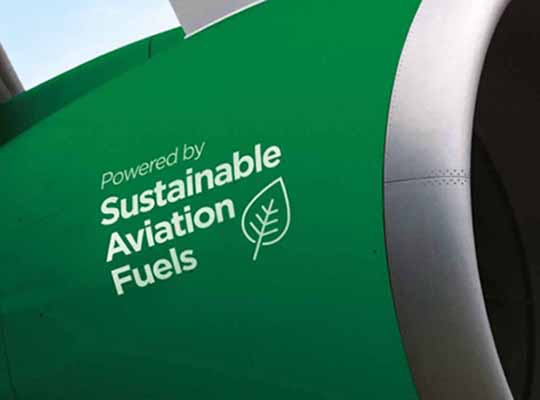BANGALORE, India – Sustainable Aviation Fuel Market by Fuel Type (Biofuel, Hydrogen Fuel, and Power to Liquid Fuel), Aircraft Type (Fixed Wings, Rotorcraft, and Others) and Platform (Commercial Aviation, Military Aviation, Business & General Aviation, and Unmanned Aerial Vehicle): Global Opportunity Analysis and Industry Forecast, 2021–2030. It is published in Valuates Reports under the Renewable & Alternative Energy Category.
The global sustainable aviation fuel market was valued at USD 72.1 million in 2020 and is projected to reach USD 6,261.9 million by 2030, registering a CAGR of 56.4% from 2021 to 2030.
The goal of SAF is to recycle carbon from current sustainable biomass or gases into jet fuel in order to replace fossil jet fuel refined from petroleum crude oil. The goal of SAF is to recycle carbon from current sustainable biomass or gases into jet fuel in order to replace fossil jet fuel refined from petroleum crude oil. IATA member airlines and the aviation industry as a whole are committed to meeting aggressive emissions reduction targets.
Sustainable aviation fuels (SAF) have been identified as a vital component in achieving these objectives. Using sustainable aviation fuels to meet the industry’s climate targets will require government backing.
Major factors driving the growth of the sustainable aviation fuel market are:
Factors such as an increase in the number of airline passengers combined with an increase in disposable income, an increase in air travel, and an increase in synthetic lubricant use all contribute to the sustainable aviation fuel market growth.
Furthermore, the development of environmentally friendly and safe aviation lubricants, as well as the rise in demand for low-density lubricants to reduce weight, are likely to provide numerous opportunities for sustainable aviation fuel market expansion throughout the forecast period. Usage of sustainable aviation fuels results in positive brand awareness, better customer retention and adherence to government green initiatives.
TRENDS INFLUENCING THE GROWTH OF SUSTAINABLE AVIATION FUEL MARKET
The rise in the number of airline passengers, coupled with increased disposable income is expected to drive the growth of the sustainable aviation fuel market. Most people choose to travel by air over other conventional modes of transportation since it is the safest and fastest mode of transportation with the fewest flight cancellations. As a result, air travel is more dependable than other modes of transportation and provides a more pleasant ride. This leads to an increase in the size of the aircraft fleet as well as the frequency of flights, which necessitates efficient fuels and, as a consequence, boosts the worldwide sustainable aviation fuel market. Customers favor air travel, despite its high cost, because of increased disposable income and reduced travel time.
An increase in the consumption of synthetic lubricants is predicted to increase the growth of the sustainable aviation fuel market. Synthetic lubricants provide thermal stability, enhanced energy efficiency, improved performance in harsh situations, and oxidation resistance, all of which contribute to the sustainable aviation fuel market’s growth. Synthetic lubricants also offer improved resistance to frictional wear of expensive aircraft components, as well as longer lubricant service life, propelling the industry toward positive growth globally. Furthermore, companies involved in the development of sustainable aircraft fuels have implemented development strategies to deliver improved and highly efficient lubricants, which support the growth of the sustainable aviation fuel market.
Currently, most airlines, such as KLM Royal Dutch Airlines and United Airlines make use of biofuels. Biofuels are made from used cooking oil. Discarded cooking oil is inexpensive and simple to refine. Aemetis is also constructing carbon zero Sustainable Aviation Fuel (SAF) and renewable diesel fuel bio-refineries in California using renewable oils and orchard and forest waste. Such advancements in the sector of aircraft lubricants aid in pollution reduction and are projected to provide a plethora of growth opportunities for key players in the global sustainable aviation fuel market.
However, crude oil price fluctuations have a direct impact on the manufacturing of aviation fuels. As a result, a rise in crude oil prices has a greater impact on airlines, as an aircraft uses 14 liters of fuel per kilometer on average, resulting in higher operating costs. As a result of the rise in crude oil prices, higher aviation fuel prices stifle Sustainable Aviation Fuel market expansion.
SUSTAINABLE AVIATION FUEL MARKET SHARE ANALYSIS:
Based on Fuel Type, Power to liquid fuel is projected as the most lucrative segment. The biofuel segment dominated the global sustainable aviation fuel market in 2020, in terms of revenue. Due to substantial advancements in technology approaches to commercializing the use of alternative jet fuel, biofuel production is likely to scale up rapidly in the coming decade.
Based on Aircraft type, others are projected as the most lucrative segments. The fixed wings segment incurs a higher share.
Based on the platform Unmanned Aerial Vehicle is projected as the most lucrative segment, the commercial aviation segment incurs a higher share.
Based on Region Asia-Pacific would exhibit the highest CAGR of 60.9% during 2021-2030. North America is the highest revenue contributor followed by Europe. Due to increased air traffic, countries in North America, such as the United States and Canada, are focusing on various projects to use renewable aviation fuel to meet the requirement for reduced carbon footprints. The North American market is considered to be one of the strongest demand areas for sustainable aviation fuel due to supportive legislation and measures to reduce aviation emissions.
KEY MARKET SEGMENTS
By Fuel Type
- Biofuel
- Hydrogen Fuel
- Power to Liquid Fuel
By Aircraft Type
- Fixed Wings
- Rotorcraft
- Others
By Platform
- Commercial Aviation
- Military Aviation
- Business & General Aviation
- Unmanned Aerial Vehicle
By Region
- North America
- U.S.
- Canada
- Mexico
- Europe
- UK
- Germany
- France
- Russia
- Rest of Europe
- Asia-Pacific
- China
- Japan
- India
- South Korea
- Rest of Asia-Pacific
- LAMEA
- Latin America
- Middle East
- Africa
Key Players
- Aemetis Inc.
- Avfuel Corporation
- Fulcrum Bioenergy
- Gevo
- Lanzatech
- Neste
- Preem AB
- Sasol
- SkyNRG
- World Energy













